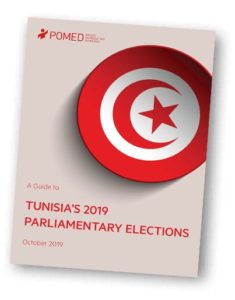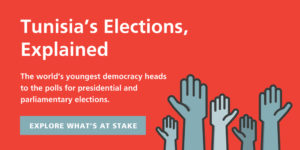 Law professor Kais Saied, an independent candidate who did little campaigning, was projected to win a landslide victory (The FT reports, HT:CFR) in the country’s presidential election. Saied, a social conservative, was backed by Ennahda, the moderate Islamist party that won last week’s parliamentary election.
Law professor Kais Saied, an independent candidate who did little campaigning, was projected to win a landslide victory (The FT reports, HT:CFR) in the country’s presidential election. Saied, a social conservative, was backed by Ennahda, the moderate Islamist party that won last week’s parliamentary election.
Firmly conservative, Saied opposes equal inheritance rights for daughters and sons, arguing that the hot-button issue is decided by the Quran, the Muslim holy book, according to the AP.
But Ben Mubarek, who has known Saied for many years, says he is neither an Islamist nor a fundamentalist. He has spoken against changing the constitution to base it on Islamic law and his wife, a judge, does not wear a headscarf, Reuters adds. He has urged a crackdown on foreign money in Tunisia, including on spending by non-government and civil society organizations, which he sees threatening Tunisian society.
A self-proclaimed modernist, he said he would seek partnerships with companies such as Microsoft, Google and Netflix to create jobs, and holds up women as pillars of society, the Times reports. During an unprecedented TV debate, Karoui promised to combat extremist violence by “attacking at its roots” and raising economic prospects in struggling provinces that are fertile recruiting grounds for the Islamic State group and other extremists.

POMED
Tunisia is seen as the only democracy to emerge from the Arab revolts against dictatorship in 2011, and its elections are recognised as genuine expressions of the people’s will — a rarity in the Arab world, the FT adds. but…
Saied is critical of the country’s system of parliamentary democracy and favours a system in which small, elected councils would choose regional representatives who would in turn select national representatives. It is unlikely though that he would have the space to introduce such a radical change. The president in Tunisia has limited powers, with his authority exercised mainly in foreign relations, defence and security.
“Saied is the real anti-system candidate,” said Youssef Cherif, head of the Columbia Global Center in Tunis, part of Columbia University. “He has a reputation as a clean and righteous man…..The problem is that he is utopian and he doesn’t have a constituted political party to back his agenda.”

Carnegie
The holding of presidential candidate Nabil Karoui in pre-trial detention for weeks before Sunday’s election has raised concern about the vote despite his release on Wednesday, a foreign monitoring team in Tunisia said on Sunday, Reuters reports.
“The detention of one of the presidential candidates and his inability to campaign on a level playing field gives us grounds for concern,” said Les Campbell, a joint leader of the National Democratic Institute and International Republican Institute observer mission in Tunisia.
The International Republican Institute (IRI) and the National Democratic Institute (NDI)* joint international election observation mission released a preliminary statement of findings and recommendations following the runoff election, including:
- timely responses to election-related challenges by electoral authorities that are supported by evidence;
- review and amendment of certain electoral regulations that many stakeholders claim are onerous;
- measures to ensure the inclusion of a high number of effectively disenfranchised voters; and
- continuing support from the international community for key electoral bodies. .
 “Tunisia’s runoff presidential election concludes a remarkable electoral period that included three national elections in four weeks and the country’s first live-televised presidential and parliamentary debates,” said Maureen White, a member of the NDI Board of Directors. “Election officials conducted the polls confidently and knowledgeably, and the day’s proceedings were calm and orderly.”
“Tunisia’s runoff presidential election concludes a remarkable electoral period that included three national elections in four weeks and the country’s first live-televised presidential and parliamentary debates,” said Maureen White, a member of the NDI Board of Directors. “Election officials conducted the polls confidently and knowledgeably, and the day’s proceedings were calm and orderly.”The arrest and detention on charges of money laundering and tax evasion of one of the presidential candidates, Nabil Karoui, and his inability to campaign freely, was cause for concern, the delegation added.
“The success of an election cannot be judged by Election Day alone,” said Scott Mastic, Vice President for Programs at IRI. “Although Karoui was released and appeared in a debate, the fact remains that his incarceration prevented him from freely seeking votes for most of the campaign period and prevented voters from fully knowing him and his platform.”
*Core institutes of the National Endowment for Democracy.
Click here to download the full report.







